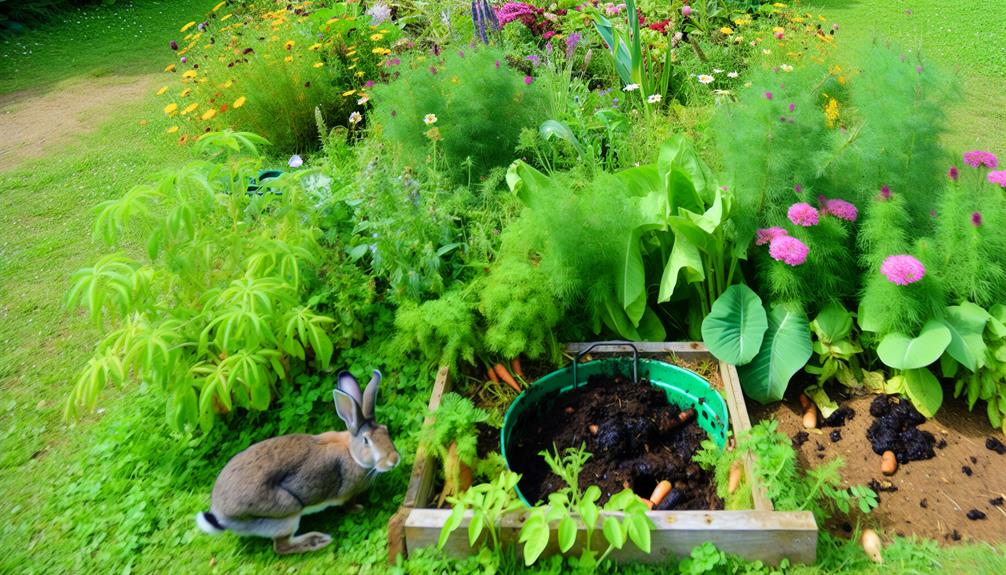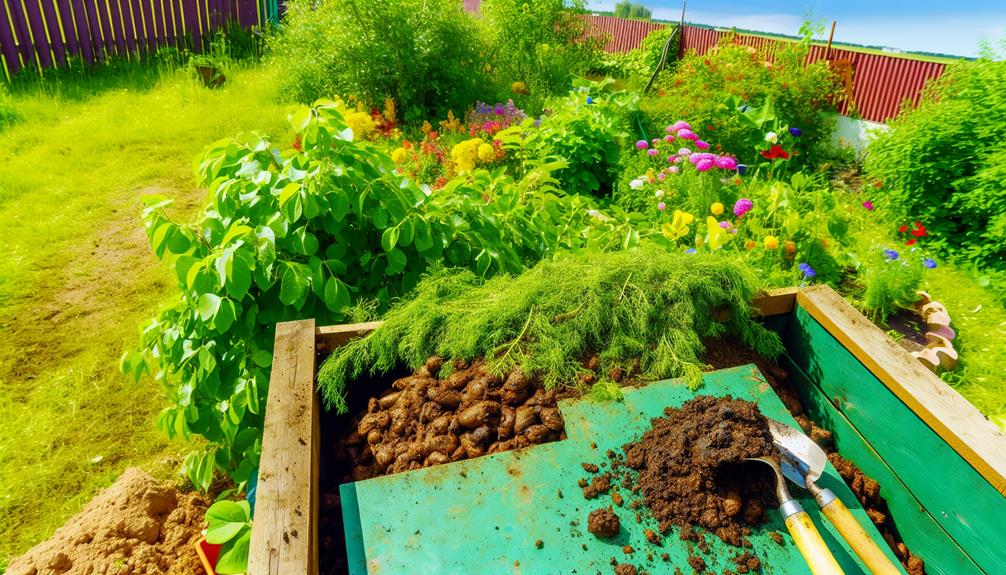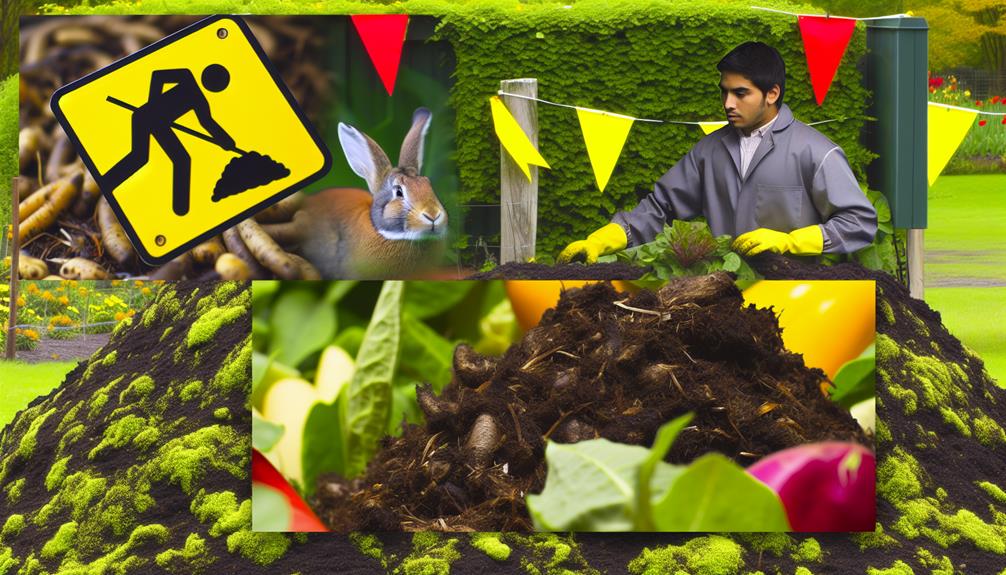

Yes, you can compost rabbit manure. It’s high in nitrogen, phosphorus, and potassium, all key nutrients for plants. To compost it efficiently, mix fresh droppings with organic materials like straw or hay in a compost bin. Monitor moisture levels and turn the pile regularly for proper aeration. If you use fresh manure, it enriches soil directly without needing composting first.
Be mindful of pathogen risks: make sure the compost reaches 131°F to kill harmful microorganisms. Following proper composting practices guarantees a balanced and nutrient-rich result. For more expert tips on composting rabbit manure, you’re on the right track.
Containing high levels of nitrogen, phosphorus, and potassium, rabbit manure is a nutrient-rich fertilizer that can greatly benefit your garden. It’s not just rich in these essential nutrients; it also boosts microbial diversity, which is important for a healthy composting process. These microbes play a key role in the breakdown of organic matter, turning rabbit manure into a potent fertilizer that your plants will love.
When you add rabbit manure to your compost pile, you’re introducing a source of food for beneficial bacteria and fungi. These microorganisms accelerate the nutrient breakdown, transforming raw manure into a stable, nutrient-packed compost. This process not only enriches the compost but also supports the microbial diversity that’s essential for maintaining a balanced ecosystem in your garden soil.
To maximize the benefits, mix rabbit manure with other compost materials like kitchen scraps, leaves, and grass clippings. This balance helps maintain the right carbon-to-nitrogen ratio, ensuring efficient composting. Regularly turning the pile will also aid in aeration, further promoting microbial activity and nutrient breakdown.
Also Read: Can You Compost Rotten Bananas?
Incorporating rabbit manure into your soil not only enriches it with essential nutrients but also improves its structure and fertility. Rabbit manure is rich in nitrogen, phosphorus, and potassium, which are important for plant growth. This natural fertilizer releases nutrients slowly, guaranteeing your plants receive a steady supply over time.

Adding rabbit manure boosts soil enrichment by increasing its organic matter content. Organic matter helps retain moisture, reducing the need for frequent watering. It also enhances soil aeration, allowing roots to access oxygen more easily. This improved structure supports robust root systems, promoting healthier and more productive plants.
By using rabbit manure, you’re also fostering beneficial microbial activity in your soil. These microorganisms break down organic matter, making nutrients more accessible to plants. This process not only improves soil fertility but also helps in disease suppression, creating a more resilient garden ecosystem.
To maximize the benefits, mix rabbit manure well into your garden soil. This ensures even distribution of nutrients and organic matter.
Whether you’re growing vegetables, flowers, or shrubs, rabbit manure is a valuable addition to your garden, contributing to a thriving, vibrant soil environment. Embrace this natural method for a flourishing garden.
Also Read: Can You Compost Ice Cream?
To start composting rabbit manure, gather fresh droppings and mix them with other organic materials like leaves, straw, and kitchen scraps. This blend creates a balanced compost pile, ensuring the right mix of nitrogen and carbon. The rabbit droppings provide a rich nitrogen source, while leaves, straw, and scraps add the necessary carbon.

Choosing the right bedding is essential; opt for straw or hay, as these materials compost well and add valuable carbon. Avoid pine or cedar shavings since they decompose slowly and can be harmful to beneficial microbes. Collect the soiled bedding along with the manure and add it to your compost pile.
It’s vital to use a compost bin to keep your pile contained and manageable. A bin helps maintain the right temperature and moisture levels, speeding up the composting process. Turn the compost regularly to aerate it, ensuring that oxygen reaches all parts of the pile. This accelerates decomposition and prevents foul odors.
Monitor the moisture level; it should be as damp as a wrung-out sponge. If needed, add water or dry materials to maintain balance.
With these steps, you’ll efficiently compost rabbit manure and produce rich, fertile compost for your garden.
Fresh rabbit manure is a nutrient-rich fertilizer that can benefit your garden, but you need to be cautious about potential pathogens and parasites. You should apply it properly to avoid any health risks and maximize its effectiveness.
In the next sections, you’ll learn about the best methods for using fresh manure safely.
You’ll find that rabbit manure offers a nutrient-rich boost to your garden, even when used fresh. For those dedicated to organic gardening, rabbit manure is a fantastic choice. Thanks to a rabbit’s herbivorous diet, their droppings are packed with essential nutrients like nitrogen, phosphorus, and potassium. These nutrients are crucial for plant growth, making your garden flourish.
When you use fresh rabbit manure, you’re directly integrating these nutrients into the soil. This can help improve soil structure, promote healthy root development, and increase water retention. Unlike some other types of manure, rabbit manure doesn’t need to be composted before use, so you can apply it straight to your garden beds.
Simply scatter the pellets around your plants or mix them into the top layer of soil. This approach not only feeds your plants but also encourages beneficial soil organisms, creating a thriving ecosystem in your garden.
Being mindful of potential pathogen and parasite concerns is essential when using fresh rabbit manure, as it’s highly beneficial. Fresh manure can harbor disease vectors that may pose risks to your garden and health. To minimize these risks, you should follow proper composting techniques to guarantee safety.
First, know that compost duration is key. Allowing rabbit manure to compost for at least 60-90 days can greatly reduce the presence of harmful pathogens. This period ensures that the manure heats up sufficiently to eliminate many potential disease vectors, making it safer for use in your garden.
Turning the compost regularly helps to aerate the pile, which encourages the breakdown of organic matter and speeds up the composting process. Additionally, maintaining moisture levels is important—too dry, and the composting slows down; too wet, and it can become a breeding ground for unwanted organisms.
When using fresh rabbit manure, direct application methods can provide immediate nutrient boosts to your garden. Fresh rabbit manure is rich in nitrogen, phosphorus, and potassium, making it a fantastic composting alternative. You can scatter the pellets directly around your plants, ensuring they’re lightly mixed into the soil. This not only feeds your plants but also promotes manure aeration, enhancing soil structure.
To make the process more manageable, let’s break it down:
| Application Method | Benefits |
|---|---|
| Surface Scatter | Quick nutrient release, easy to apply |
| Soil Incorporation | Improved soil aeration, reduced odor |
| Liquid Tea | Fast absorption, targeted feeding |
By scattering the manure on the soil surface, you provide a quick nutrient release that’s easy to apply and manage. For a more integrated approach, incorporate the manure into the soil. This method enhances soil aeration and reduces odors. If you prefer a liquid application, create rabbit manure tea by soaking the pellets in water. This allows for fast absorption and targeted feeding directly at the plant roots.
Using these methods, you can effectively utilize fresh rabbit manure, offering your plants the nutrients they need without the lengthy composting process.
Also Read: Can You Compost Mail?
When composting rabbit manure, you need to be aware of potential risks. Pathogen contamination, managing nitrogen levels, and ensuring proper composting practices are essential to avoid problems.

One potential risk of composting rabbit manure is the contamination of pathogens that could harm both plants and humans. While the composting process can kill many harmful organisms, it’s important to guarantee manure safety to avoid any health issues. Rabbit manure can contain bacteria and parasites that might survive inadequate composting conditions.
To keep your composting process safe and effective:
Managing the nitrogen levels in your compost pile is essential to avoid issues like ammonia odor and nutrient imbalances. Rabbit manure is rich in nitrogen, which plays a vital role in the nitrogen cycle of your compost.
However, too much nitrogen can disrupt the compost balance, leading to unpleasant smells and slow decomposition. To maintain a healthy compost balance, you need to oversee the carbon-to-nitrogen (C:N) ratio carefully.
Rabbit manure, being high in nitrogen, should be balanced with carbon-rich materials like straw, leaves, or shredded paper. Aim for a C:N ratio around 25-30:1 for ideal composting.
If you notice a strong ammonia odor, it’s a sign that your pile has too much nitrogen. Add more carbon-rich materials to absorb the excess nitrogen and restore balance. Turn the pile regularly to guarantee proper aeration, which helps keep the nitrogen cycle in check.
Balancing the nitrogen levels in your compost pile is just the beginning; you also need to be aware of potential risks associated with improper composting practices. Using composting bins and composting tools correctly can help mitigate these risks and guarantee your compost is safe and effective.
First, be cautious of anaerobic conditions. Lack of oxygen can cause your compost to become smelly and less effective. This often happens in tightly packed composting bins. Regularly turning your compost with the right tools can help maintain aeration.
Second, make sure to avoid adding diseased plants or weeds that have gone to seed. These can survive the composting process and spread when you use the compost in your garden.
Third, be mindful of pests. Improperly managed compost can attract rodents and insects. Ensure your composting bin is secure and food scraps are covered properly.
Fourth, watch out for excess moisture. Too much water can also lead to anaerobic conditions and slow down the composting process. Keep your compost moist, but not soggy.
Also Read: Can You Compost Rust?
To get the most out of composting rabbit manure, focus on maintaining the right balance of carbon and nitrogen. Start by using compost bins to help you manage this balance more effectively.
Rabbit manure is high in nitrogen, so you’ll need to add carbon-rich materials like straw, leaves, or shredded paper. Aim for an ideal temperature of 130-150°F to guarantee efficient decomposition and pathogen elimination.
Turn your compost pile regularly to introduce oxygen, which speeds up the process and prevents foul odors. Moisture is also essential; your compost should feel like a damp sponge. Too dry, and the decomposition slows; too wet, and it may start to smell.
Keep an eye on your compost to make sure it’s breaking down properly. A healthy compost pile will have a sweet, earthy smell and shouldn’t attract pests. If you notice any issues, adjust the balance of green (nitrogen) and brown (carbon) materials accordingly.
Yes, rabbit manure can attract pests when composting, but with proper pest prevention methods, you can successfully compost indoors. Make sure your compost is well-maintained, and you’ll create a safe, pest-free environment for everyone.
Rabbit manure’s decomposition time depends on your compost conditions. Under ideal conditions with good aeration and moisture, it can take around 2-3 months. By engaging in composting, you’re contributing to a sustainable, eco-friendly community.
Yes, you can safely use rabbit manure in your vegetable garden. Its nutrient content is rich, promoting healthy plant growth, and there are minimal disease concerns, making it a great choice for your gardening community.
Yes, you can definitely use rabbit manure in worm composting systems. It enriches the worm diet and promotes compost aeration. You’ll be contributing to a thriving community of gardeners who value sustainable practices and healthy gardens.
Yes, you should mix rabbit manure with other compost materials. Rabbit manure is rich in nitrogen, so balance it with carbon materials like straw or leaves. This creates a healthy compost, fostering a sense of community among gardeners.
To sum up, you can compost rabbit manure to enrich your soil with essential nutrients. Make sure you properly balance green and brown materials, and regularly turn the compost for aeration.
Using fresh manure directly is also an option but be cautious of potential pathogens. Always wash produce thoroughly if applying fresh manure.
Follow these expert tips to make the most of rabbit manure in your gardening efforts, promoting healthier plants and more productive soil.
